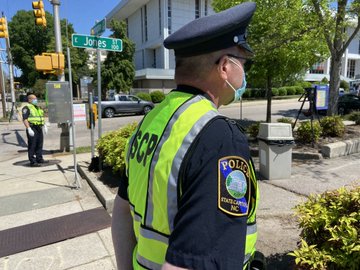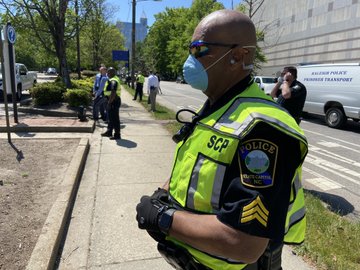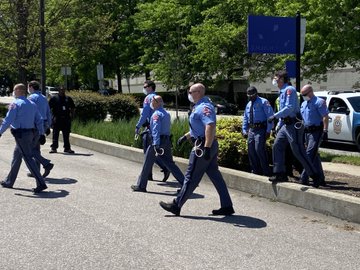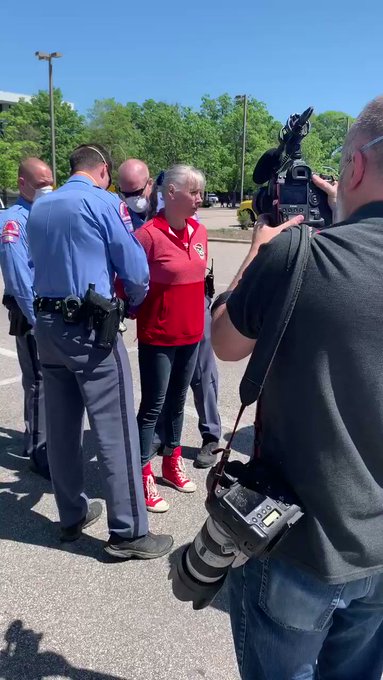Attorneys for ReOpen NC, the organization that is holding protests in defiance of the lockdown orders in North Carolina, sent a fiery letter to Governor Roy Cooper, demanding that he ease up on the orders and ensure that no one will be thrown in jail for exercising their 1st Amendment right to free speech and protest.
Specifically, attorney Michael Best, along with co-counsel James Lawerence and Anthony Biller, have been retained by Kristen Elizabeth and Monica Ussery. They are planning second round of protests this Tuesday.
ReOpen NC has 53,000 people in their facebook group as of this writing.
This was the scene a few days ago, when Ussery was arrested by police for illegally 1st Amendmenting. 

Third & final @raleighpolice warning appears to working as much of the crowd disperses. @WakeSheriff prison transports also arriving now, as officers also start walking through the parking lot and going to car to car. @ABC11_WTVD @ABCPolitics @ABC #abc11 #coronavirusNC
NEW: At least one person now under arrest by @raleighpolice for refusing to leave #ReopenNC demonstration outside @ncleg. At its height, there were probably 100+ people at the tailgate-style rally. @ABC11_WTVD @ABC @ABCPolitics #coronavirusNC #StayAtHome #abc11
836 people are talking about this
Those officers don’t appear to be following social distancing guidelines.
The letter was sent to Governor Cooper, Wake County commission chair Greg Ford, state attorney general Josh Stein, and Lee Lilly, director of legislative affairs for the governor’s office.
Parts of the letter include:
However laudable the goal, the economic and social consequences of the governmental response to the COVID-19 crisis have been and are real, concrete, and harmful. Yesterday The Washington Post reported that 22 million Americans have filed for unemployment since President Trump declared a national emergency in March. Here at home, the impact on North Carolinians has been similarly catastrophic. The News and Observer reported that during a news conference on April 8, Governor Cooper himself acknowledged the “overwhelming crush” of new unemployment claims as the number of newly unemployed North Carolinians soared to near 500,000. Many of these unemployed members of our community are some of our State and Wake County’s most economically vulnerable citizens. Many include members of working families and single mothers. Many of these people do not have the luxury of working from home. At the same time, the employers of these workers are watching businesses some spent a lifetime to build slipping away. Working from home is not an option for them either.The social consequences of the COVID-19 response have been and continue to be substantial. The preamble of the North Carolina Constitution acknowledges God and “our dependence upon Him for the continuance of” our liberty for “us and our posterity.” With our fellow citizens reeling, processing the grief and trying to pick up the pieces, your orders have caused houses of worship to shutter their physical doors. Again, the burden falls disproportionately upon the poorest and most vulnerable among us who lack the modern staples of high-speed internet and smart phones. ReOpenNc’s desire to raise its collective voice on behalf of those deprived of their right to participate in the corporate worship of God, the dignity that comes from work, and the businesses many spent a lifetime building is entirely understandable, reasonable, and laudable.ReOpenNC self-organized around the idea that, in light of the above, your quarantines should be lifted in whole or in part to allow North Carolinians to return to work and life activities, while taking individual precautions. To that end, ReOpenNC organized a peaceful political protest at the Raleigh capitol on April 14, 2020. At the resulting protest, the Raleigh police department issued orders that all individuals in attendance were required to maintain six feet separation from each other, irrespective of whether they were members of the same household and irrespective of whether they were minor children. Reportedly, several mothers refused to force their young children in attendance to separate and departed the protest to avoid further confrontation with law enforcement. Thereafter, law enforcement personnel arrested Ms. Ussery for attending an illegal mass gathering. Ms. Ussery is charged with violating Governor Cooper’s executive order 121 pursuant to N.C.G.S. §14-288.20A, with a hearing in Wake County Criminal District Court scheduled for June 25, 2020.
In response to local and national outcry regarding Ms. Ussery’s arrest and flagrant violation of her civil rights, various agencies and local authorities issued inconsistent views on the meaning and implementation of Governor Cooper’s Executive Order 121. The Raleigh Police Department (“RPD”), having consulted with acting Wake County District Attorney Lorrin Freemen, prior to the protest, responded to inquiries regarding the perceived infringement on protestors’ First Amendment rights on the social media platform Twitter stating, “[p]rotesting is not an essential activity.” Raleigh Police Department later updated this statement on its Twitter account by stating, “[b]oth the Governor and County have declared a state of emergency. Under these current and temporary declarations, protesting is not listed as an essential function.” These sentiments were later affirmed by Ms. Freeman, when she stated to WRAL that RPD’s reading of Executive Order 121 was “technically correct.” She went on to explain that arrest would be used as a last resort and that officers would continue “giving a wide legal berth to peaceful protest.” Further muddying the legal standard applied to “mass gatherings” for public protest, Governor Roy Cooper issued a statement through spokesman Ford Porter stating, “While protests can be subject to restrictions on time, place and manner, they are held as a fundamental right under the Constitution and are not listed in the order.” Governor Cooper, when questioned directly, created further ambiguity by explicating that his orders “do not interfere with people’s constitutional rights to express themselves” but instead addressed “unlawful mass gatherings.”The plaint text of the aforementioned orders, the manner in which the Order was enforced against Ms. Ussery and the subsequent statements from public officials constitute broad restraints on public speech and present a ban on all public gatherings of any size in Wake County. Restrictions on content-neutral speech must be narrowly tailored for a specific government interest. McCullen v. Coakley, 573 U.S. 464, 486 (2014). “For a content-neutral time, place, or manner regulation to be narrowly tailored, it must not burden substantially more speech than is necessary to further the government’s legitimate interests.” Id. (internal quotations omitted). To meet this requirement, “the government must demonstrate that alternative measures that burden substantially less speech would fail to achieve the government’s interests, not simply that the chosen route is easier.” Id. at 495. For example, McCullen compared a law requiring a “buffer zone” outside abortion providers that prohibited contact between people with that zone to an earlier law that required people to stay six feet apart outside providers unless consent was given to further approach. The former was found not to be narrowly tailored, as the latter in conjunction with existing laws accomplished the same goals. Id. at 496-497.
Attorney Anthony Biller then goes on to cite numerous 1st Amendment cases where the higher courts have reversed convictions of people who were charged with similar illegal 1st Amendmenting or upheld 1st Amendment protections, such as Shuttlesworth v. Birmingham, McCullen v. Coakley, Cox v. New Hampshire, Edwards v. South Carolina, and, perhaps the most applicable one because it was a North Carolina case that was ruled on just 2 years ago, Packingham v. North Carolina.
Biller elaborates:
As recently as 2017, this State was rebuffed by a 8-0 margin at the United States Supreme Court over attempts to enforce a law less broad and far-reaching than the orders at issue here. In Packingham v. North Carolina, 137 S. Ct. 1730 (2017), the Supreme Court invalidated North Carolina’s social media law. Id. at 1738. In the process of articulating its holding, the Supreme Court noted that the broad law at issue in Packingham, a statute which expressly prevented registered sex offenders form using commercial social networking programs, “applies to about 20,000 people.” Id. at 1734. The orders at issue here apply to all of the more than ten million people who live in this state and criminalize a broad swath of innocuous activity. The overbroad nature of the orders themselves are irreconcilable with Packingham.
Biller stresses that his “clients would prefer to resolve these issues amicably” and they “request written statements from Governor Cooper’s office and the Wake County Commissioners that protestors will not be detained, arrested or prosecuted under their quarantine orders so long as at such protests, individuals who are not members of the same household maintain at least six feet of separation from individuals of other households. We also request that all criminal charges against Ms. Ussury be immediately dismissed.”
They ask that the governor’s office respond by Monday at 2:00 PM. Toward the end, the letter includes “If your offices do not provide reasonable assurance and objective standards that preserve my clients’ constitutional rights, we will have no choice but to seek emergency legal relief in advance of Tuesday’s planned protest.”
Then you have the crazed leftist activists, such as BlueNC.com, who, after spending four years calling a Trump a fascist dictator, are now cheering on suspension of Constitutional rights by mocking and berating anyone who has the audacity to want to exercise some freedom by leaving their homes, doing the 1st Amendment, and wanting to reopen the economy.








Post a Comment